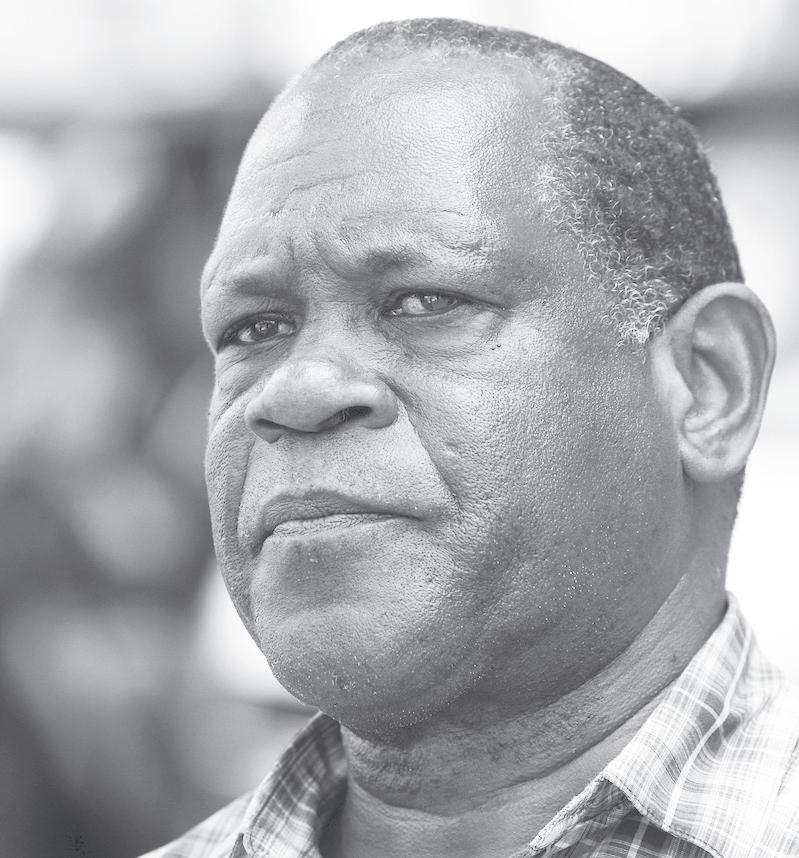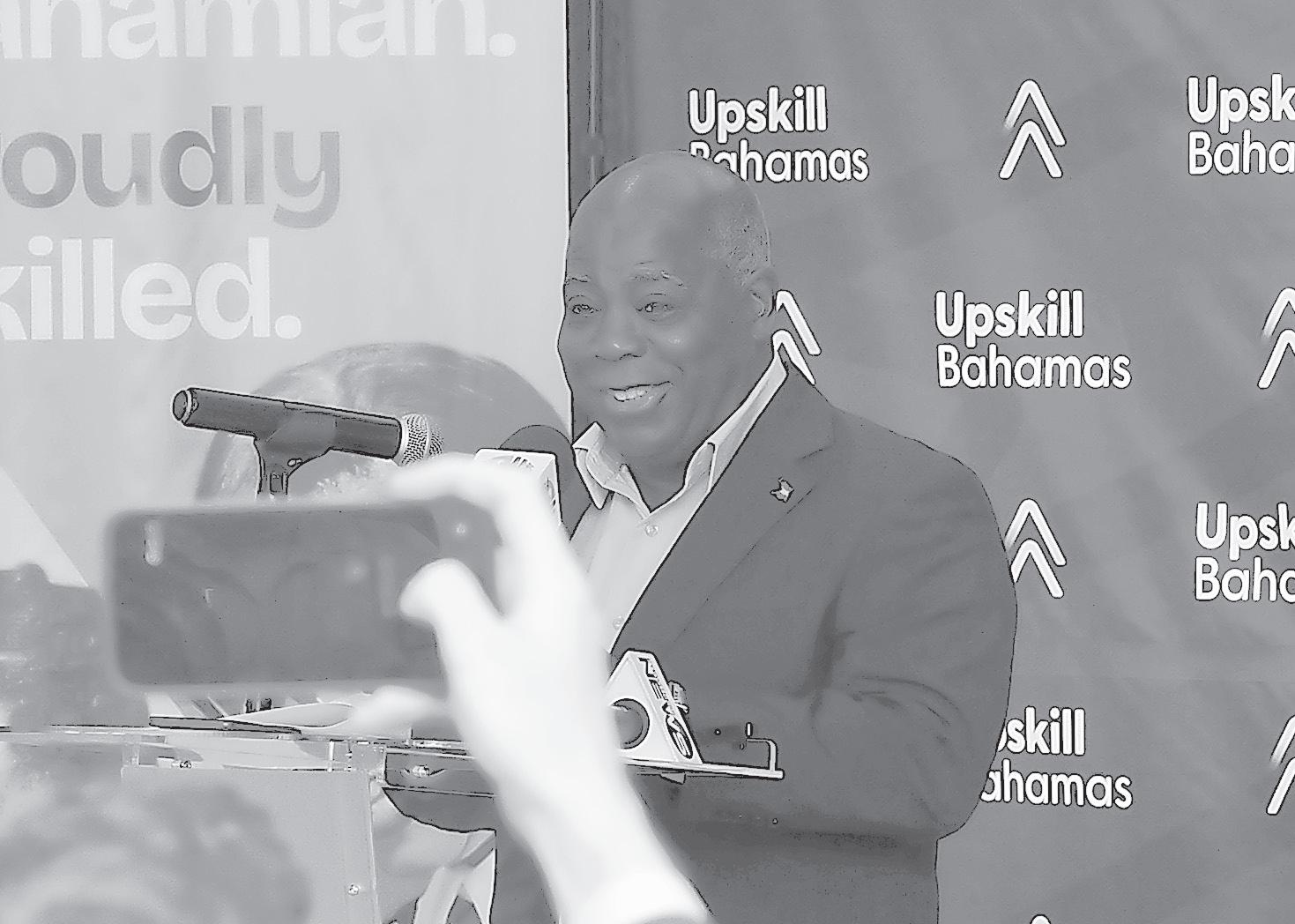










By RASHAD ROLLE Tribune News Editor
rrolle@tribunemedia.net
A GRAND Bahama
woman who launched a devastating acid attack that left a suspected love rival blind and permanently disfigured has failed in her bid to win a lighter sentence after the Court of Appeal refused to reduce the seven-year maximum imposed by a magistrate who called the case one of the “worst of the worst.” Stephanie Braynen was left in agony, with flesh dripping off her face, after Pandora McKenzie
threw a metal cup of a corrosive substance into her face after her husband had taken Ms Braynen to their home to help convince his wife they were not having an affair.
Ms Braynen described the pain as feeling as if “her entire face was on fire,” with the liquid searing down her throat, nose, chest, arms, ears, and hair. Her sight was immediately impaired.
McKenzie’s husband Edward Deveaux testified that when he entered the room where what was described as the
Court of Appeal rejects woman’s appeal for leniency on sentence BODIES OF
By LEANDRA ROLLE Tribune Chief Reporter
lrolle@tribunemedia.net
THE families of two Bahamian men killed in a drug-related operation in Haiti in July will finally get to bury their loved ones
after their bodies arrived in The Bahamas this week, bringing some closure to what relatives described as a frustrating and depressing ordeal that cost them thousands.



American granted $60,000 bail over Abaco crash that killed teacher and nephew
By PAVEL BAILEY Tribune Staff Reporter pbailey@tribunemedia.net
AN American man was granted $60,000 cash bail yesterday after being accused of causing a fatal
traffic accident in Abaco last Friday that claimed the lives of a teacher and her nephew. Prosecutors allege that John Griffith Porth, 63, of St Matthew’s, South Carolina, was driving dangerously on SC Bootle Highway when he
AG: By-Election
crashed his Ford Excursion head-on into Monique Williams’s vehicle as she drove her 13-year-old nephew, Terrance Williams, to school at around 8am on November 21.
By AVA TURNQUEST Tribune Digital Editor aturnquest@tribunemedia.net
FORMER Attorney General Sean McWeeney, KC, believes the Golden Isles by-election delivered a political boost for Free National Movement leader Michael Pintard while dealing a “knock in the head” for the Progressive Liberal
Party, despite its victory at the polls and the popular belief that the results prove the PLP has the momentum heading into the next general election. PLP candidate Darron Pickstock secured 1,873 votes to FNM candidate Brian Brown’s 1,636, with the Coalition of Independents finishing a distant third at 348 votes and independent candidate Karen Butler receiving 16. Although the PLP won the overall count, the FNM captured more polling divisions, underscoring the constituency’s competitiveness. Against that backdrop, Mr McWeeney said Mr Pintard emerged from the by-election in a stronger position.



SHADRACK STUART (LEFT) AND JOEY RUSSELL
CHARGED from page one CHARGED
The bodies of Shadrack
Stuart and Joey Russell had been held up in a Haitian morgue for months by bureaucratic delays and what relatives called a lack of official assistance.
They said a single missing signature from a Haitian doctor stalled the repatriation process, prompting repeated pleas to the government for help.
Austin Russell, Joey’s brother, confirmed yesterday that the family’s calls were finally answered after receiving notice earlier this month that his brother’s body would be returned.
He said the remains arrived in New Providence over the weekend, with the family planning a burial next month.
Meanwhile, Stuart’s wife confirmed that her husband’s body arrived yesterday.
“Right now we’re happy because we already know they kill him but we’re happy we get his body so we can lay him on the side of old lady”
The Tribune yesterday.
Still, he said the government could’ve acted faster and criticised their slow response.
He said the family sacrificed by spending thousands of dollars in Haiti, mostly on preserving his brother’s body, and stressed that their requests for help from the Ministry of Foreign Affairs were never financial in nature.
Ms Williams, 53, a veteran pre-school teacher, and the young Mr Williams died from their injuries.
Porth and his wife, who were in the SUV, were reportedly heading to a bone-fishing trip to Green Turtle Cay and were driving on the wrong side of the road at the time of the crash. This was reportedly Porth’s first visit to the country.
The double fatality devastated the Treasure Cay community. SC Bootle High High School, where Terrance was an eighthgrade student, dismissed students early on Friday.
A third passenger in Ms Williams’s vehicle, Calsey
Rolle, remains in hospital, according to relatives.
Porth was not required to enter a plea to two counts of vehicular manslaughter when he appeared before Senior Magistrate Kara Turnquest Deveaux. He was informed that the matter would proceed to the Supreme Court through a voluntary bill of indictment. He was granted $60,000 cash bail. As part of his bail conditions, he must be fitted with a monitoring device and sign in at his local police station. Porth returns to court for the service of his VBI on March 16, 2026. Heda Hunt represented the accused, while Inspector K Wilkinson was the prosecutor.
Mr Russell described the prolonged wait as frustrating and filled with many sleepless nights.
He added that social media chatter about the men’s deaths, along with circulating images of their bodies, offered no comfort and only deepened the family’s distress.
He believes the government only intervened after
The Abaco men were shot in Haiti in July during what officials there described as a drug-related operation. While Stuart died at the scene, Joey succumbed to his injuries days later in hospital under what relatives say were suspicious circumstances. A third man, Rashad Fox, of Sandy Point, is also believed to be dead.
public backlash over its decision to fund accommodations for Bahamians who travelled to Jamaica for a wedding during Hurricane Melissa, among other controversies.
Mr Russell also cited the recent death of a 16-yearold Bahamian student in Panama and the government’s efforts to repatriate her body as encouraging factors.
“They were saying that they were going to bring them home and everybody was making noise about that and right after that, we got a phone call saying the bodies would be coming home the next week,” Mr Russell told
“You ain’t checking for your own people who put you there,” he added.
“Everything is about the foreigners.”
He said while the return of his brother’s body offers some closure, the family still hopes for justice but remains doubtful considering Haiti’s ongoing crisis.
“Right now we’re happy because we already know they kill him but we’re happy we get his body so we can lay him on the side of old lady,” he said.
He said he already informed his sisters not to expect justice, saying efforts to sue Haiti would be a waste of time given the slow pace of the justice system.


“That crown on Pintard’s head can rest more securely today than yesterday,” Mr McWeeney, a PLP stalwart, wrote.
“By performing impressively in yesterday’s by-election (even winning a majority of the polling divisions 8-6), the FNM and Pintard can point to all that as evidence that he is indeed a viable leader of a resurgent Party - no need to send a SOS out to Papa!”
Mr McWeeney shared his post-race commentary in a message to colleagues yesterday. Turning to the Coalition of Independents, he said the party’s performance fell short of expectations. He noted the COI lost its deposit by failing to reach

the legal threshold of 16.6 percent, adding he was surprised after its online presence and visibility throughout the campaign. According to the unoffical results reported by the
Parliamentary Commissioner Harrison Thompson, the COI finished the race with 348 votes.
“For all the noise they were making and all the social media coverage they
were getting, I thought they would have done better than they did (then again voters may have had Lincoln-fatigue by the end of it all),” he said. He argued that the COI’s votes in Golden Isles “prevented the PLP from winning an outright majority,” and, if added to the FNM’s tally, would have flipped the seat.
“That’s what spoilers do,” he said. “And the COI are certainly shaping up to be spoilers in ‘close’ seats in the next General Election. Bottom line: they can’t win but they can cause you to lose.”
Mr McWeeney also praised Mr Pickstock’s showing, noting the PLP candidate had only 41 days to introduce himself to voters. “Darren came into Golden Isles a virtual unknown to constituents
(in contrast to the FNM’s candidate who had good solid history there),” he noted. “In just 41 days, Darren made the rounds, showed himself to be a class act from start to finish, and ended up in victory.” He credited PLP strategists Jerome Fitzgerald and Kevin Simmons in their roles as campaign managers as well.
Nonetheless, the former attorney general said Monday’s results should be sobering for the government, particularly given the close margin, the FNM’s strength across multiple boxes, and the heavy resources deployed by the PLP.
“Yesterday’s results will no doubt be seen (and felt) as a knock in the head, all the more so when one considers the massive firepower and resources
the government had brought to bear,” he said. “All of it turned out to be a bit underwhelming if the final count is anything to go by.”
He warned the PLP that viewing the by-election as affirmation rather than caution would be a mistake, pointing to the national pattern of oneterm governments over the past two decades.
“If, however, yesterday’s results are interpreted as an affirmation that all is hunky-dorry and right on track, or if nothing but excuses are forthcoming now as to why the PLP didn’t get more votes yesterday, the cycle that has seen every single governing party in the past five General Elections get tossed out after just one term is bound to repeat itself - again,” he said.
By JADE RUSSELL Tribune Staff Reporter jrussell@tribunemedia.net
THE Bahamas Taxicab Union is preparing for weeks of escalating industrial action, with president Tyrone Butler warning that long-standing grievances are being ignored and accusing the government of enabling illegal operations that cut into taxi drivers’ livelihoods.
Mr Butler said the union has reached a breaking point after months of alleging that livery drivers openly solicit passengers in areas reserved for taxis, with hotel properties and major transport hubs allowing the practice to flourish.
“I think you'll see more industrial unrest starting to happen,” he said yesterday.
“I think, from our perspective, we intend to step up our activity in the next couple of weeks or couple of months. Because, I mean,
we can't continue to operate where the government is allowing one fraction of society to operate illegally.”
He has repeatedly accused drivers working for livery services of violating the law by picking up customers at locations including Atlantis, Nassau Cruise Port, Margaritaville, and the Lynden Pindling International Airport under the Nassau Airport Development Company’s oversight. Asked whether he believes the government will intervene, Mr Butler said he does not, adding that he expects tensions to deepen.
He also accused Minister of Transport and Energy JoBeth Coleby-Davis of siding with the livery sector. “She's always been a staunch advocate for the livery drivers, so she continues to insist that they have a right to operate, even though they're operating
illegally,” he said.
The dispute escalated earlier this year after the BTCU complained that livery drivers were soliciting passengers in restricted zones. In August, the Ministry of Transport and Energy said it had formally sought legal guidance from the Office of the Attorney General on how the Road Traffic Act applies to the competing groups.
“While the Ministry of Energy and Transport will proceed in accordance with this legal advice, our steadfast commitment remains to supporting a regulatory framework that is equitable, modern, and aligned with the realities of today’s transportation sector,” the ministry statement said.
The ministry added that the conflict stems from “differences over the interpretation and application of the Road Traffic Act” and noted that its goal is to “work toward solutions
‘People have to steal to eat’: Charity faces crisis as demand for food surges
By KEILE CAMPBELL Tribune Staff Reporter
kcampbell@ tribunemedia.net
GREAT Commission
Ministries’ resources plunged to just $246 last month as demand for food, shelter, and emergency support continues to rise amid a surging cost of living, founder Bishop Walter Hanchell said yesterday.
The bishop, speaking during a press conference announcing the charity’s inaugural Hope Fest, described a ministry under intense strain — donations down, needs up, and more families slipping into desperation. He said GCM’s finances have been moving “up and down” as the organisation struggles to keep pace with a deepening social crisis.
GCM feeds up to 600 people a day and also provides groceries, shelter, and support for homeless residents. Its work includes a weekly Children’s Club, a substance abuse treatment programme, and daily street outreach.
Bishop Hanchell said the pressure is mounting as more parents arrive with children seeking food and assistance. He described a spike in young men suffering mental and emotional breakdowns, many so disoriented that staff must go out and find them.
“Some of them don't even have enough sense to come here to get a plate of food but we go and we find them and we take them a plate of food every single day,” he said. “We take food to the elderly, to shut-ins. People all over this island get food from Great Commission.”
He said it is no longer unusual to see families living in their vehicles. He

recalled cars pulling up
“with all the clothes in the back and the children in the backseat,” noting that for some, the vehicle has become their only home. He gave another recent example of a jobless carpenter who came seeking help; GCM gave him groceries, money, and assistance securing employment.
Bishop Hanchell directly linked this level of hardship to rising desperation across the country, saying food insecurity can push people toward crime.
“People have to steal to eat,” he said. “The cupboard is empty. The children saying, ‘Daddy, I'm hungry’, what can you do? You ain't got no job. You don't get no money. What can you do?”
He said the ministry’s operating expenses now exceed $5,000 a day, requiring 300 pounds of meat daily, even as donations have fallen over the past six months.
“That's like three banquets every single day,” he said. “Some people who come to us, the only meal they get for the day is the food that they eat right here.”
Groceries, he said, are “very expensive,” forcing the organisation to spend thousands of dollars each week just to keep people fed.
Despite the exhaustion and financial strain, Bishop Hanchell said GCM continues its mission because the work is spiritually driven. He noted the ministry would have closed long ago “every time we get down” if not for unexpected help.
“Every time we get down, God just sends a miracle and we're able to get food,” he said. “This don't just happen. It comes with sacrifice from a lot of people with help.”
He urged residents to take the need seriously, saying many Bahamians pass the building daily without realising what is happening inside.
“A lot of people drive past Wulff Road every day, they drive past with their head straight,” he said.
“Don't just pass us by. Stop and drop means slow down, stop as you pass, and drop off some money, some grocery or some meat.”
that balance the interests of all parties”.
Frustrations boiled over this month when taxi drivers staged a loud demonstration outside Nassau Cruise Port.
The Tribune previously reported that three taxi drivers were arrested during clashes with police as the protest snarled access to the port.
Mr Butler clarified yesterday that two drivers were arrested. He said they pleaded guilty in court and are scheduled to return for another date in the coming months. They were charged with disorderly behaviour and resisting arrest.
Although the union has not yet met with port officials — something Mr Butler attributed to scheduling conflicts — he said the BTCU is pushing for a meeting next month. He added that the protest made clear the union’s determination not to be ignored.

Opening of $3.5m homeless shelter pushed back two years amid serious setbacks
By KEILE CAMPBELL Tribune Staff Reporter kcampbell@tribunemedia.net
GREAT Commission Ministries’ long-promised Hope City homeless shelter has been delayed until 2026, with founder Bishop Walter Hanchell acknowledging the project has run into “serious problems” but vowing to give the public a full update before the year ends.
He declined to discuss the setbacks during yesterday’s briefing, saying the ministry will hold a separate press conference dedicated solely to the issue.
“It has been delayed,” he said. “But it will become a reality, God willing, in 2026.”
Hope City, announced in 2023, is planned as a two-storey, 100-bed complex with dormitories and an empowerment centre for skills training, job-readiness initiatives, and broader life-skills development. The project has approved plans, costings, and a construction estimate of $3.5m.
Paul Daniel Lewis, chair of GCM’s Resource and Philosophy Committee, said the ministry’s future expansion depends heavily on increased volunteer participation. He tied that
need directly to Hope City’s launch and the scale of the organisation’s ongoing outreach.
“We are taking it to another level in 2026 and beyond, simply because there is a need,” he said.
“We respond to the need, and we also anticipate the need.” He pointed to programmes such as “Live to Give” and “Stop and Drop”, along with direct-deposit options, as ways residents and corporate partners can contribute consistently.
He added that Hope City remains a central piece of GCM’s long-term strategy to move vulnerable people from survival to stability.
“People can feel equipped and be able to change their lives beyond the feeding programme,” he said.
Bishop Hanchell said the ministry is already running a monthly upskilling initiative called “Power Up”, aimed at helping disenfranchised people regain independence.
“We bring these people right in here and we train them every month,” he said, noting that experts and professionals lead the sessions.
“Budgeting, how they can improve their life. We don’t just want to feed them; we want to empower them.”
He said the pressure on GCM’s emergency housing continues to exceed capacity.
“Great Commission Ministries is the only organisation in the country, outside of the government of The Bahamas, that shelters homeless men, women and children,” he said.
When its shelters are full, GCM moves families into hotels to keep them off the streets.
“We find a hotel to make sure those mothers and their children get off the street, get out of living in their vehicles, get them out of these abandoned, derelict buildings, and we get them a room with a roof over their head,” he said.
He added that families living in their vehicles seek help more often than many realise.
“Someone pulls up in a car with all the clothes in the back and the children in the backseat, and that’s home,” he said.
Bishop Hanchell said the surge in demand requires a surge in public support. GCM is seeking at least 200 new volunteers to support its sheltering, feeding, and outreach operations in 2026.

ATTACK from page one
‘cruel and horrific’ attack took place, the scene was almost unrecognisable.
Ms Braynen stood frozen “as a statue,” he said, with “her flesh dripping off of her.” He told the court that McKenzie was standing over the injured woman, “brandishing a cutlass” as if preparing to strike. He tackled her to disarm her.
The court heard that Deveaux had collected Ms Braynen in his bus and taken her to the property for what was supposed to be a clarifying conversation.
Instead, the court found, Ms Braynen walked into a trap.
Without warning, McKenzie flung the cup of a corrosive substance directly into Ms Braynen’s face. She was rushed first to the Eight Mile Rock Clinic, then taken by ambulance to Rand Memorial Hospital. She was later flown to New Providence for specialist care at the Princess Margaret Hospital and subsequently to Bascom Palmer in Miami. Despite extensive treatment, she is now permanently blind and disfigured. McKenzie was charged with Causing Dangerous Harm and stood trial in the Magistrate’s Court after the attack in November 2020.
After assessing the evidence, Magistrate Simone
Brown convicted her and imposed the statutory maximum of seven years. During sentencing, the magistrate said the injuries were “cruel and horrific,” adding that McKenzie had “passed a sentence upon the victim which is worse than death.” She noted that the victim “has to live everyday not being able to see,” can no longer work, and relies entirely on the assistance of others. She rejected McKenzie’s claims of self-defence, pointing to her attempt to wield a cutlass moments after throwing the acid. Calling the case “one of ‘worst of the worst’,” the magistrate said it “warrants the maximum penalty.” McKenzie appealed,
arguing that the sentence was excessive given her age, lack of prior convictions, and expression of remorse. Her counsel argued that the magistrate erred in calling the case “worst of the worst,” claiming the phrase is traditionally used in the context of death-penalty jurisprudence. He also contended that a probation report should have been sought before such a severe sentence was imposed.
The Court of Appeal rejected every argument. Justices Turner, Smith, and Fraser said the magistrate properly weighed both aggravating and mitigating factors, acted within her statutory powers, and exercised her discretion
reasonably. They stressed that while maximum sentences are rare, they are appropriate for “the most serious incidents,” and this case squarely fits that category. The court also distinguished the matter from Dashernique Gibson, a recent three-year case involving a corrosive substance cited by McKenzie’s lawyer. In Gibson, the injuries, while serious, did not involve permanent blindness or full-body chemical burns. In contrast, the judges said, McKenzie’s attack caused catastrophic, lifelong harm, and the manner in which it was carried out placed it among the most severe cases possible before a magistrate.
The appellate panel highlighted key findings: that McKenzie lured Ms Braynen to her home under the guise of resolving a suspicion, waited with the corrosive substance concealed in a cup, threw it directly into her face, and then armed herself with a cutlass while the victim was defenceless.
The judges noted that the magistrate did take into account that this was McKenzie’s first offence and that she expressed remorse. Still, they concluded there was no error in principle and held that the seven-year sentence “would meet the circumstances of this case.”
By EARYEL BOWLEG Tribune Staff Reporter
ebowleg@tribunemedia.net
CHIEF Justice Ian Winder warned yesterday that artificial intelligence must never “distort or diminish justice,” urging the Industrial Tribunal to adopt stronger protections as it expands its use of digital tools.
He delivered the caution during the opening of the tribunal’s legal year, saying technological progress can improve fairness and efficiency only when paired with strict safeguards. While he acknowledged the value of modern systems in reducing backlogs and improving transparency, he cautioned that innovation cannot come at the expense of judicial integrity.
He said many tribunal users represent themselves, making digital tools helpful when deployed responsibly.
“I readily accept that an environment heavily utilised by unrepresented litigants, such a tool represents a very useful aid,” he said.
“I therefore encourage the industrial tribunal to consider the guidance recently issued by the Supreme Court on the responsible use of artificial intelligence and see how this could assist its continued work.” He added: “I therefore encourage the president to take deliberate steps to strengthen the Tribunal's processes to guard against misuse of technology and to ensure that efficiency is pursued without sacrificing thoroughness.”
Industrial Tribunal President Indira Demeritte-Francis used her remarks to announce that the tribunal has already launched an artificial intelligence pilot project. The pilot is designed to assist with legal research, judgment formatting, and tracking case timelines, forming part of a broader modernisation push that will be evaluated for potential expansion in 2026. She said these upgrades reflect the tribunal’s ongoing shift toward full digital transformation.
Her comments followed a high-profile directive from Sir Ian earlier this month, reported by Tribune Business, outlining the Supreme Court’s own standards for AI after an attorney submitted three “fake cases” generated by an AI tool in support of her legal argument. The Supreme Court referred the matter to the Bahamas Bar Council’s ethics committee.
The report noted that the courts “will be fully accountable to the public for any use of AI in decision-making functions”, ensuring its deployment never threatens a person’s right to a fair hearing “before an impartial tribunal”.
“Generative AI may be used to assist judicial officers and court users with material for court proceedings, including the drafting of documents, summarising information and drafting decisions,” the directive states. It makes clear, however, that responsibility remains with human users.
“Judicial officers and
By EARYEL BOWLEG
Tribune Staff Reporter
ebowleg@tribunemedia.net
INDUSTRIAL Tribunal President Indira
Demeritte-Francis said the body concluded 68 percent of the cases filed during 2023 and 2024, unveiling a two-year statistical report that charts rising referrals, heavier caseloads, and sustained judicial productivity. She presented the figures yesterday as the tribunal opened its legal year. Because no special sitting was held in November 2024, the tribunal did not issue annual reports for the previous two years. The combined report therefore offers a full account of its workload, performance, and institutional growth across both periods.
In 2023, the tribunal received 258 certificates of referral — 149 in New Providence and 109 in the northern region — and managed 145 cases. Judges disposed of 228 matters that year. Referrals climbed to 270 in 2024, with 186 in New
Providence and 84 in the northern region. The tribunal managed 133 cases and recorded 131 disposals. “The statistics for the two years reveal a clear trajectory of productivity and improvement,” the president said. “A total of 528 certificates of referrals were filed during the period under review. Of these, the tribunal disposed of a total of 359 matters, while an additional 278 cases were actively managed within the same timeframe, demonstrating continued progress in case resolution and administrative efficiency.”
She later added: “The combined statistics indicate that 68 percent of the matters filed were concluded. This reflects a positive trend of maintaining productivity and judicial efficiency over the review period, reflecting consistent judicial oversight and a sustained commitment to prevent backlogs and enhancing productivity within the tribunal's operation.”
Ms Demeritte-Francis said the tribunal’s judicial complement has grown
sharply over the past decade, expanding from two to six substantive judge appointments. She said that growth reflects a parallel rise in employment-related disputes and a more active, complex labour market.
“This may be attributed to several factors; an expanding workforce, heightened awareness of employee rights, increased regulatory oversight, and broader shifts in employment, including the growth of fixed term contracts, redundancies and digital and non traditional forms of work,” she said.
“These changes have necessitated greater judicial oversight in industrial relations, and have placed increased demands on the industrial tribunal's capacity to deliver timely, reasoned decisions.”
She said the tribunal’s expansion underscores a wider national reliance on formal adjudication to settle workplace disputes, reinforcing its role as an accessible, credible forum for enforcing labour rights and supporting productivity and social stability.
A CANADIAN girl was allegedly sexually assaulted on a beach in Grand Bahama on Monday.
Police said shortly after 10am, the teenage girl was collecting shells along the shoreline when an unidentified man approached her and asked her to follow him to a nearby shed, where he claimed to have an assortment of shells. The girl complied and
accompanied him to a shed situated in a bushy area. The man, described as a slim, dark-skinned man with several missing teeth, allegedly sexually assaulted her there.
Armed robbers steal woman’s purse containing cash belonging to her employer
court users assume full responsibility for the accuracy, appropriateness and relevance of any material filed.
“The court may require a user to disclose whether a Generative Al tool was employed in the preparation of any document or evidence. Court users should be prepared to identify specific portions of their submissions influenced by Generative AI and explain the steps taken to ensure accuracy.”
The directive warns that generative tools can produce “hallucinations and may be inaccurate”, generating results that “may be biased, incomplete or in breach of copyright” and which cannot guarantee confidentiality.

Sir Ian added.
“Sensitive material and information to which
“Court users shall not input privileged or sensitive information into unsecured AI platforms as Chat Bots prompts, requests or interactions within the programme may be automatically added to the large language model database, and used to respond to queries from other users which would make confidential information potentially available to others unless it is disabled,”
professional privilege may attach may not be inputted by court users in a public chatbot.”
The chief justice said these standards will be essential as more judicial bodies adopt AI tools, stressing that modernisation must never weaken public trust in the courts.

NULLIUS ADDICTUS JURARE IN VERBA MAGISTRI
“Being Bound to Swear to The Dogmas of No Master”
LEON E. H. DUPUCH,
Publisher/Editor 1903-1914
SIR ETIENNE DUPUCH, Kt., O.B.E., K.M., K.C.S.G., (Hon.) LL.D., D.Litt .
Publisher/Editor 1919-1972
Contributing Editor 1972-1991
RT HON EILEEN DUPUCH CARRON, C.M.G., M.S., B.A., LL.B.
Publisher/Editor 1972-
Published daily Monday to Friday
Shirley & Deveaux Streets, Nassau, Bahamas N3207
TELEPHONES
News & General Information
(242) 502-2350
Advertising Manager (242) 502-2394
Circulation Department (242) 502-2386
Nassau fax (242) 328-2398
Freeport, Grand Bahama (242)-352-6608
Freeport fax (242) 352-9348
WEBSITE, TWITTER & FACEBOOK
www.tribune242.com

@tribune242
tribune news network

THE cry on the campaign trail for the PLP was heard a number of times – don’t vote FNM and stop the work of this government.
But is the work of this administration really being felt where it is needed?
There has been union unrest – seen most strikingly in the protest outside Parliament by the Bahamas Union of Teachers and Bahamas Public Service Union. That soon went from smiles between Prime Minister Philip Davis and teaching union president Belinda Wilson to Mr Davis giving Mrs Wilson the cold shoulder as he breezed past without talking.
In today’s Tribune, there is more talk of union action – this time from the Bahamas Taxicab Union, whose president, Tyrone Butler, warns that long-standing grievances are being ignored.
Much of that unrest is focused around conflict with livery drivers competing with taxis at Atlantis or the airport, at the cruise port or at Margaritaville.
On one hand, you have the government urging people not to interrupt the work of this administration. On the other, you have unions in dispute with the government, to the extent that strike action is threatened or even carried out. Whatever the work is the government is doing, these unions are not feeling the benefit, it would seem.
More strikingly, read today’s story about Great Commission Ministries.
Great Commission, under the guidance of Bishop Walter Hanchell, is one of the great institutions in our country.
Year after year, day after day, Great Commission has been reaching out to those living on the edge, struggling with poverty, struggling to put food in their bellies day after day.
The commission feeds 600 people a day – and that is just the most obvious part of their work. They also provide groceries, shelter, help for the homeless.
There have been a number of occasions when people have knocked on the door of The Tribune, desperate for help, and the commission has been able to provide that person with a shower and new clothes, food in their stomach and most importantly guidance for what to do next to try to find their way back to having a roof over their head and the support to seek a job.
Things are getting tighter, according to Bishop Hanchell, and not just for those the commission helps.
The ministry almost ran out of funds last month, with their accounts dropping to just $246. Demand for food is on the rise. Demand for shelter is on the rise. Demand for emergency support is on the rise.
Bishop Hanchell says it is no longer unusual to see families living in their vehicles. He sees cars pull up “with all the clothes in the back and the children in the backseat”.
He warns such desperation can drive people towards crime, saying: “People have to steal to eat. The cupboard is empty. The children saying ‘Daddy, I’m hungry’, what can you do? You ain’t got no job. You don’t get no money. What can you do?”
In that context, when our leaders urge people to keep on the same path – how many of those people they are calling on are feeling better off this year than last year? How many are hungry? How many are unsure where their next pay cheque is coming from?
Of course the government wants to continue its work – but amid all the regular talk of how the economy is doing, how much of that is being felt on the streets?
So when some people hear the government saying let’s keep going the way we are, for those on the edge, that is a question of life and death.
Great Commission is managing to get through – just about. Bishop Hanchell says every time they struggle, “God just sends a miracle and we’re able to get food”.
That might be so, but we also need to give a helping hand ourselves. The ministry will welcome support, we are sure.
But as for those rallying cries about not stopping the work of this government? If the people do not feel the benefit of this government, then the work is doing nothing for them and a change of course might be the only way they see hope.
As confident as this government might be, it must not leave people behind. Only when the work seeks to benefit all is it worth continuing. Those left behind get to vote too.


EDITOR, The Tribune.
BETWEEN November 25-December 10th an ongoing effort has been initiated internationally to prevent and eradicate violence against girls and women. An international effort presenting educational activities, seminars, workshops, conferences, and orientation experiences to every sector of the populations initiating the programmes. A challenge for sure, particularly in societies where a woman’s rights are officially recognised but not actually socially protected.
We are talking about societies such as these...
• Central and Latin American, Spanish and Italian Societies that experience the effects of “machismo”. Women are often seen but not heard, respected or appreciated.
• Societies that place women and girls on a secondary level socially, religiously and politically. Arabian and Middle Eastern Cultures and their faiths, Orthodox Judaism, Right Wing Christian Orthodoxies, The Roman Catholic Churches treatment of aspiring women to the priesthood and so on. Women within the Balkans and Slavic national zones are also taken for granted socially. It is easy for men to ignore and forget the needs, aspirations and dreams of their “weaker sexed partners”.
• Every culture and society experiences the mind
set of “might makes right”. Men are usually stronger and more historically influential than women within their communities, work place and societal groups. Girls are often not even considered within the equality movements efforts as girls are seen simply as younger women. Girls are a separate level within the gender battle both significant and futuristically. Your neighborhood and even your family unit can or does experience some form of gender abuse or prejudicial attachment. Modern North American and European Society still isolates and oppresses its female population by paying less, not offering the policesearns power within corporate and governmental bodies. Economists of the past viewed women as less costly employment options and now hope that women will flow back to the traditional homes as homemakers. Less women at the table gives the stronger and meaner sex an opportunity to aspire too. The battle within our homes shows just how difficult society finds itself as it tries to determine polices based upon gender equality. A general sense of gender enslavement still exists in much of the world where a girl and woman face forced
intimate experiences, a lack of progressive thought and a chance for a better future. Assault upon girls and women continues to escalate in much of the developing world, as too our so called First World. Pornography and sexual criminality levels increase as to the number of women’s centers for abuse. It is believed that incest levels and the abuse of young girls, while often hidden, continue to increase and organisational efforts to make it legal remain.” Incest is best” but only for the abuser, not the abused. In collaboration with organisations that support victims and survivors this movement presents itself as a righteous alternative to the criminality of assault and abuse hurdled at most women and the girls of the future by authoritarian individuals and organisations with an agenda. To deny a woman or girl the opportunity to achieve is in itself a moral and ethical crime against humanity. Any ideology, religious cultural custom or organisational determination that limits the rights and privileges of a woman and girls progress is obstructionist and morally misguided patriarchy.
“Men should think twice before making widowhood a woman’s only path to power” Gloria Steinem STEVEN KASZAB Bradford, Ontario November 25, 2025.
No plan, no skills and no progress
EDITOR, The Tribune.
WE are caught up in political debates while neglecting the Crisis that will shape our future: Human Capital. We invest energy in political theatrics but rarely face the reality that our workforce is unprepared for the economy we aspire to create. Low productivity and insufficient skills are not minor issues; they are central to our stagnation.
Our economy is narrow and fragile, relying heavily on tourism, offshore finance, construction, and the public sector. These industries increasingly require workers who are tech-savvy, data-literate, and capable of providing reliable service. However, many employers struggle to find individuals with strong basic and technical skills, while thousands remain unemployed or underemployed because their skills do not align with available jobs. This situation is not merely “unemployment”; it represents a structural skills mismatch.
The Bahamas has a longterm National Vision and Strategy Framework called Vision 2040, which identifies human capital, governance, the economy, and the environment as its core pillars. However, it functions more as a reference booklet than a practical roadmap. It is not currently guiding hiring decisions, training budgets, or aligning the efforts of ministries, state-owned enterprises (SOEs), schools, and training institutions. Additionally, it has not been updated to address the changes in a post-COVID, AI-driven world.
Our education and training system still operates as if the world is moving
slowly. There is no national skills observatory to track emerging jobs, identify skills in short supply, or assess whether our institutions are responding adequately. While technical and vocational training exists, it is not offered at the scale or speed necessary to meet current demands. Skills in digital technologies, data analysis, AI awareness, and advanced service competencies remain optional rather than essential.
The public sector reflects this issue as well. The civil service and SOEs are organised around positions and grades instead of skills and performance. There is no comprehensive inventory of the skills available within the government.
Human resources functions are primarily transactional, focused on payroll and paperwork, rather than engaging in strategic workforce planning. Although we may implement portals and digital forms, we are not utilising data to address basic questions: Where are our critical gaps? Who can be retrained? Which units consistently exhibit low productivity?
This is not only a governmental issue; many private-sector firms view training as a cost to be minimised rather than an investment to be embraced. Instead of cultivating talent pipelines, we tend to poach talent from one another or import skills from elsewhere. Few industries have established serious sector-wide skills strategies, structured apprenticeships, or long-term agreements with schools and colleges. The result is predictable: a workforce that is overworked and underprepared, with businesses expressing dissatisfaction about skills
they have not helped to develop.
If we are serious about our future, we must stop viewing this as merely a political issue and recognise it as a national emergency regarding human capital that requires a collaborative response from both the public and private sectors. We need a data-driven national strategy for human capital and productivity that encompasses the entire economy. This includes establishing a “National Productivity and Skills Council” to measure productivity, identify gaps, and align education, training, labor, and economic policies. We should implement an integrated skills and HR analytics system across government and major industries to guide hiring, redeployment, and retraining. Additionally, we need a skills roadmap for the next 10 to 20 years, focusing on areas such as AI, digital services, the blue-green economy, fintech, advanced tourism, logistics, cybersecurity, and other needed 21st-century skills. The issue is not with the Bahamian people; our citizens are talented, creative, and resilient. The real problem lies within a system, both public and private, that fails to recognize, develop, and effectively utilise that talent.
We can continue to debate politics while ignoring the Skills Crisis, or we can address the core of our National Progress: The Need To Build the Bahamas’ Human Capital.
E M SOPHIA-CHOKHMAH Freeport, Grand Bahama November 25, 2025.

By LYNAIRE MUNNINGS Tribune Staff Reporter lmunnings@tribunemedia.net
A MAN who restrained a 14-year-old girl in a wooded area for nearly a week— handcuffing her to a Dilly tree, tying a rope around her neck, sealing her mouth with duct tape and having unlawful sexual intercourse —has been unanimously denied permission by the Court of Appeal to challenge his 20-year prison sentences for unlawful sexual intercourse, forcible detention, and kidnapping.
The court ruled that his application had “no prospects of success” and that the original sentencing judge acted well within the proper range given the prolonged captivity, the child’s age, and the breach of trust involved.
The perpetrator, Lincoln Poitier, a family friend and distant cousin of the teenager, lured the girl under the guise of a normal outing.
On January 3 2004, he took her to the Town Centre Mall, where he bought her a Baby G watch. The court recounted that he then drove her to a secluded track road, forced her out of the vehicle, and handcuffed her to a Dilly tree. A rope was tied around her neck and duct tape sealed her mouth, leaving her restrained in the bushes. Over several days, Poitier returned intermittently, leaving the teenager alone in these conditions.
The girl remained tied to the tree for approximately six days, until she managed to escape on January 8, 2004. She ran to the main road, where a passer-by rescued her and took her to Princess Margaret Hospital. In its judgment, the court emphasised the gravity of the offences, noting the combination of unlawful sexual intercourse, forcible detention, and kidnapping.
“I acknowledge that the court has a wide and unfettered discretion to sentence
an accused, who has been convicted, for any offence, at the end of his trial,” the judgement read. “I have reviewed and considered the relevant statutory provisions and the case law. I have also had regard to aggravating and mitigating factors herein. I take judicial notice of the prevalence of sexual assaults. I have also taken particular notice of the circumstances surrounding the acts herein of forcible detention, kidnapping and the unlawful sexual intercourse of the complainant, who was aged 14 years, at the time, and was sexually abused and suffered alone in the wilderness, handcuffed and tied to a tree for six days, until she was able to escape and was eventually rescued.”
Poitier’s appeal, filed nearly three months late, challenged only the two 20-year sentences for unlawful sexual intercourse. His attorney, Marianne Cadet, argued
that the punishment was excessive, claiming the sentencing judge improperly considered his alleged lack of remorse and treated the case as though it involved a different offence. The court rejected these arguments, highlighting that the judge had carefully considered both aggravating and mitigating factors. The court noted that the sentencing judge had cited several aggravating factors, including the breach of trust, the disparity in age between the offender and the victim, and Poitier’s refusal to accept responsibility. The only mitigating factor identified was the absence of previous convictions. “After a review of the circumstances of the offence and of the offender which were before the judge at the sentencing hearing on December 17, 2014, we were unable to say that she erred,” the court ruled.
The girl had known him since she was six, and her mother regularly allowed him to supervise her children, trusting his guidance.
The court also dismissed Poitier’s argument that trial delays justified a reduced sentence. It outlined an 18-year timeline showing his repeated failures to appear at case management hearings, multiple warrants
The court further said that the judge was correct in using rape cases as a benchmark, as Parliament intended strong protections for minors under the Sexual Offences Act. The law allows for life imprisonment for unlawful sexual intercourse with a child aged 14 to 16. The court compared Poitier’s case to previous rulings, where offenders received sentences ranging from 20 to 30 years, noting that this case ranked among the most serious due to the child’s young age, the isolation, the restraint, and the prolonged fear and suffering endured. The judgment highlighted Poitier’s position of trust within the family.
for his arrest, revoked bail, and a separate five-year burglary sentence served during the same period.
While minor delays by the justice system occurred, the court found no basis to lessen the sentence.
“The Intended Appellant never complained about any delay or his right to be tried in a reasonable time. While the delay may be present, and could warrant some consideration of the sentencing judge, the sentence not being at the high end of the sentence range, there is no real prospect of having the sentence reduced. Insofar as some delay existed, therefore, the same would not have had any real impact on the appropriateness of the sentence,” the judgement noted.
The court unanimously refused Poitier’s extension of time, confirming the appropriateness of the 20-year sentences and leaving the offender to serve his full terms.
Security chiefs press for right to arm guards as official rejects opening industry to foreign labour
By LEANDRA ROLLE Tribune Chief Reporter
PRIVATE security chiefs are pressing the government to arm guards and overhaul outdated rules, while a senior official has rejected calls to open the industry to foreign workers even as he concedes the law is out of date.
The push for reform was aired at the Ministry of National Security’s recent annual Private Security Awareness and Protection Seminar, where company heads renewed demands for firearm use and salary standardisation across the sector.
Samuel Smith, manager of the Private Sector
Security Service Unit at the Ministry of National Security, said feedback from security firms is being gathered and will shape the committee’s recommendations to the minister. Private security firms and government officials are expected to meet in early January to discuss the proposals in detail. Key among those proposals is allowing some guards to carry guns.
Christopher Adderley, head of Westech Security, highlighted what he sees as unequal treatment between private security officers and law enforcement.
“As you can clearly see, we are from the same as they say pool and yet, security officers are treated
much differently,” he said. “I think that is an avenue that we have to look at, and yes, it must be at the level of lethal weapons.”
Kenton Rolle, of Diplomat Security, Consultant and Training Services, also backed allowing security officers to use force, but stressed that this must be tightly controlled.
“There have to be ongoing training to ensure that the officers are capable, and it has to be legislated,” he said.
Arlene Anderson, manager of AJA Security Services, said she has mixed feelings about putting guns in the hands of guards but believes introducing lethal weapons is necessary given the current climate. She
Man admits to having underage sex and fathering child with 13-year-old girl
By PAVEL BAILEY Tribune Staff Reporter
pbailey@tribunemedia.net
A MAN admitted to having sex with an underaged girl in the Berry Islands multiple times and fathering a child with her.
Jakyle Barry, 22, pleaded guilty to 11 counts of unlawful sexual intercourse before Justice Renae McKay as part of a plea agreement. Barry had sexual relations with the minor, whom he described as his “girlfriend”, between August 1, 2021, and April 31, 2022. The girl was between the ages of 12 and 13 during the sexual misconduct. The child Barry fathered with
her is now two years old.
Glendon Rolle, the defendant’s attorney, requested a social inquiry report to assist court in rendering an appropriate sentence.
Barry will return to court for sentencing on January 20, 2026. Basil Cumberthatch was the prosecutor.
Defendant accused of stabbing man with kitchen knife claims self-defence
By PAVEL BAILEY Tribune Staff Reporter
pbailey@tribunemedia.net
said it is a discussion worth having and moving forward on.
Under existing law, only Bahamian citizens can be employed as security guards or inquiry agents. Some companies say they are struggling to recruit enough Bahamians and want the law changed so they can hire foreigners.
Mr Smith said he opposes this and suggested some firms seek foreign hires to cut their wage bill.
“No country in the world brings foreigners into their security field. No country,” he said. “If you look at the police force, the defence, you have to be a Bahamian. I believe that area is designed for Bahamians and for Bahamians alone.”
Still, he acknowledged that the private security framework is outdated and said the ministry aims to update it through amendments that would align standards with practices in the Caribbean, the United States, and Europe. When asked to elaborate, he pointed to rapid shifts in technology and surveillance.
“For instance, you’re aware now, everyone is using technical or digital equipment to obtain information, to do reconnaissance and so on down the line so these are some of the things we are looking at in the act to make sure that these security guards are well equipped when they are going on a job.”
Mr Smith said he supports giving guards access to non-lethal weapons and confirmed that this is under serious review.
“Some of those things we are looking at, and we have been speaking to a lot of the security guard companies in that regard and like right now, we are going through the Act,” he added. Asked recently about amending the law to allow firearms for private security companies, Minister of National Security Wayne Munroe was non-committal. He said the government listens to concerns from the private sector but ultimately makes policy decisions after consulting relevant stakeholders, including the Royal Bahamas Police Force.
By JADE RUSSELL Tribune Staff Reporter jrussell@tribunemedia.net
MORE than 5000 eligible Bahamians have registered for the free courses and certifications offered by the government’s online learning initiative, Upskill Bahamas.
The platform was launched last week and offers over 40 courses from more than 30 institutions, including Harvard, Oxford and Columbia.
yesterday that Bahamians have responded with enthusiasm, selecting courses such as Digital Marketing, Business Finance, and Artificial Intelligence. Users range from students eager to learn new skills to professionals looking to advance their careers, and entrepreneurs seeking to strengthen their business plans and expertise.
A MAN was granted bail after he was accused of stabbing another man with a kitchen knife in Kemp Road earlier this month. Prosecutors allege that Gerard Thompson, 34, stabbed Scott Major with a kitchen knife and injured him on November 10 during a physical confrontation. Major was treated in hospital for his stab wounds. Thompson pleaded not guilty to assault with a dangerous instrument and causing harm before Senior Magistrate Algernon Allen Jr, claiming he acted in self-defence.
With no objection from prosecutor Sergeant 3004 Forbes, the court set Thompson’s bail at $5,000 with one or two sureties. He returns to court for trial on February 16, 2026.
Freeport resident jailed for gun offences after trying to flee by boat
BY DENISE MAYCOCK Tribune Freeport Reporter
dmaycock@tribunemedia.net
A FREEPORT man was sentenced to one year and six months in prison for firearm and ammunition possession. Kemberson Homer
appeared this week before Magistarte LaQuay Laing in Court Three. He was charged with possession of unlicensed firearm and ammunition, and discharging a firearm. The accused – who had reportedly attempted
to flee by boat and was apprehended by Bahamian authorities – pleaded guilty to all charges. Magistrate Laing sentenced Homer to 30 months imprisonment at the Bahamas Department of Corrections.
Bahamians aged 16 and older can study technology, business, finance, health, marketing, hospitality, foreign languages, Artificial Intelligence, and skilled trades, earning certificates at no cost.
The Office of the Prime Minister said in a statement
Prime Minister Philip “Brave” Davis highlighted that many Bahamians are ready to close the possibility gap between their current skills and their potential. He noted that rapidly changing technology presents both challenges and opportunities, and that Upskill Bahamas will help users unlock new paths to success. Minister of Education
Glenys Hanna-Martin, whose ministry leads the programme, said the platform offers courses tailored to the country’s diverse range of talents and interests, including options for those in tourism and agriculture, as well as caregivers, teachers, web designers, nail technicians and more. She added that Upskill represents a modern approach to supporting the country’s founding principles and mission.
Upskill Bahamas was first announced in the 2025/26 budget and is a key part of the Davis administration’s push to expand digital learning. Courses begin on 1 December. Enrolment is on a first-come, first-served basis, and applicants may choose multiple courses.


THE Global 16 Days Campaign (Against Gender-Based Violence) officially started yesterday with International Day for the Elimination of Violence AgainstWomen. Therewill bepeoplewearing orange ribbons andorange tshirts, showing their support for ending gender-based violence. This iswhat happens every year. There are fewpeople and organizations thatgo beyond awareness to focus on the changes we need to make and the barriers we face as we make those efforts. We need to criminalize marital rape. Weneedgender-equalnationality laws.We needtoname, count,and reporton thesexandgender-based killingsof women and callthem what
they are: femicide. Weneedto haveatimeline and action plan for a referendum on theissue of nationality rights to ensure that equal rights are enshrined in the constitution.We needto comeinto compliancewith the Convention on the Elimination of All Forms of Discrimination against Women (CEDAW), starting by actioningthe priorityrecommendations madefollowing the 2018 review. We are aware of theissues butneed to agitate and advocatefor them to be addressedwith solutions thattransform systemsand improve quality of life.
Here are five actions to take during this firstweek of the Global 16 Days Campaign:
Talk toa young person abouthealthy relationships. They may not want to share their experienceswith you,but youcan shareyour own.You canencouragethem toembracetheirbodily autonomy,understanding thattheyhave theright to sayno toanything thatis notcomfortable and thatthey havethe responsibilityto accept “no” from others. Ensure that they know they can come to youif anyone makesthem uncomfortableor if theyneedhelp leavinganunhealthyrelationship. Prepare yourself to be a reliable, knowledgeable support person.
2 3 4 5
Assess thedivision oflabour inyour household.Who cleansthe house?Who prepares themeals? Whois grocery shopping andmeal planning?Who does the laundry?Who isresponsible forremembering birthdays, and who plans the celebrations? Whopays thebills?Who makes arrangements for repairs and maintenance toget done?Who supervises that work? Who does the school drop-off and pick-up? Who helps with the homework?Who do thechildren go towiththeirconcerns? Whotalkstothe neighbours?Who answersthedoor? Whyare theduties dividedin thatway? Is it equitable? Havea conversation with others inthe householdabout theway youall operateandthe adjustmentsthat can be made to ensure that no one is inundated with the work of maintaining the home and taking care of the family.
Observe interactionsin theworkplace. Who takes up the most physical space? Who dominates conversations? Whointerrupts and who is interrupted? Who must leave work toattend to family matters?Who getspromoted, and who doesn t? Who cleansupafter ameetingora working lunch?How appropriate is the lightingoutside of the building? Where is the parking area in relation to the entrance/exit andthe lighting?Who plansthe workevents? Considerthefactors that contribute tothese decisions and practices. Identify the areas that gender affects.Are you comfortable raisingthis topicwith others in theworkplace? Why or why not?
Contact your Member of Parliament to share your concerns about gender-basedviolenceand thelackof actiontoaddressit.Let them know thatthis is a pressingissue. Highlight the abandonment of the marital rape bill and thegender-based violence bill. Name the women and girls who were victimsof sex- and gender-basedkillingsandtherefusal to call it “femicide.” Point to the lack ofcomprehensive sexuality education and the need for it to be in allschools soourchildren canrecognize unhealthy behaviour, know about contraceptives, understand the law on consentand recognize predatorybehaviourin adults,andknow where togo when theyneed help. Remindthem thatthere arenot enoughshelters tohousesurvivors of domestic and intimate partner violence. Ask themwhat they are doing to implement the International Labor Organization s Convention 190 on Eliminating Violence and Harassment in the World of Work. Letthemknow thatyouknowwhat they aresupposed tobe doing,that they arefailing, and thatthe general election is quickly approaching.
Mark yourcalendar and attendsome ofthe events hosted by Equality Bahamas, which includes film screenings, solutionbased discussions, and engaging withthe arts. Thefull lineupisavailable at Lu.ma/16days25

Future data centres are driving up forecasts for energy demand. States want proof they'll get built
By MARC LEVY Associated Press
HARRISBURG, Pa. (AP)
The forecastsare eye-popping: utilitiessayingthey'llneedtwoor three timesmore electricity within a fewyears to power massivenewdatacentresthatare feeding afast-growing AIeconomy. Butthechallenges somesay the impossibility of building newpowerplantstomeetthatdemandsoquicklyhassetoffalarm bellsfor lawmakers,policymakers and regulators who wonder if those utility forecasts canbetrusted.
Oneburning questionis whether the forecasts are based ondatacentre projectsthatmay never get built eliciting concernthatregularratepayerscould bestuckwiththebilltobuildunnecessary powerplants andgrid infrastructureatacostofbillions ofdollars.
Thescrutinycomesasanalysts warnoftheriskofanartificialintelligence investmentbubble that'sballoonedtechstockprices andcouldburst.
Meanwhile, consumer advocatesarefindingthatratepayersin some areas suchas the midAtlanticelectricity grid,which encompassesallor partsof13 statesstretching fromNew Jersey toIllinois, aswell as Washington,D.C. arealready underwriting the costto supply power to data centers, some of thembuilt,somenot. "There'sspeculationinthere," saidJoe Bowring,whoheads Monitoring Analytics, the independent market watchdog in the mid-Atlantic gridterritory. "Nobodyreally knows.Nobody has been looking carefully enough atthe forecastto know what's speculative, what's double-counting, what's real, what'snot."
Suspicionsaboutskyrocketingdemand Thereis nostandardpractice across grids or for utilities to vet such massive projects,and figuringoutasolutionhasbecomea hot topic, utilitiesand grid operatorssay. Uncertainty around forecasts
Reclaiming Memory withNiambi Hall Campbell-Dean, PhD on Wednesday, November26 at6pm.In thissession, we’ll speakwith theChair ofThe Bahamas NationalReparations Committee about memory, history, school curricula, and the demand for reparations. We’ll talk about the need to (re)connect with our history, keep memory, understand the relevance ofour history to wherewe are today,recognizethe challengesweface, and determine how we move forward in demanding our rights and reparations. Register at tiny.cc/16daysmemory.
Two-Faced: GenderInequality inThe Bahamas,a filmscreening onThursday, November 27at 6pm at theNational Art GalleryofThe Bahamas.ThisGina Rodgers-Sealy film explores issues of gender inequality, including rape culture, discriminatoryarticles intheconstitution, thelack ofwomen's rightsin the country, therefusal ofgovernment administrationafter governmentadministration tocriminalize maritalrape,and the rootcauses of genderinequality in TheBahamas. Registerat tiny.cc/16daystwofacedfilm
ReclaimingPower: AllWe Wantis Everythingwith SorayaChemaly on Tuesday,December1 at6pm.Published earlierthis month,Chemaly’s AllWe Want is Everything: How We Dismantle Male Supremacy isa “necessary manifesto .. .a callto refusesupremacist identities, relationships, andvalues in order to build more just, healthy, and sustainable worldsfor everyone. This conversation will delve into the themes of the book,apply themto theBahamian context,andidentify actionsweneedto take to achievegender equality. Register at tiny.cc/26dayspower.
Reclaiming Recovery: PeopleCentered DisasterPreparedness with YemiKnight andKendria Ferguson on Wednesday, December3 at6pm. Onthe heelsof thedevastationcaused bycategory five hurricane Melissa in Jamaica, this conversationwill focusondisaster preparedness and themeasures we need to taketo ensurethat itis inclusive,considering the specific circumstances of people who are situations of vulnerability
and have increased risk of severe impact. Register at tiny.cc/16daysclimate
Tiny Movements:Film Screeningand Discussion with JennGreen and Laura Sweeney onThursday, December4at 6pm. Afterlearning herhusband has been druggingand raping herfor years, Jennbeganadaily practiceofdancingin her kitchen, calling on her years of movement training and practice to create space forhealing.She filmedthispractice, shared the videos on Instagram, and gradually shared her story. Following the screening, we willbe in conversation with dancer and survivor Jenn Green and filmmaker Laura Sweeney about their work. Register at tiny.cc/16daystinymovements
ReclaimingStories:AnErasurePoetry Workshopwith SoniaFarmer on Saturday, December at 9:30am. Erasure poetryis theactofremoving textfromrecorded material to create a new narrative. Poetandfounder ofPoincianaPaper Press, SoniaFarmer, willguide participantsthrough selectingnewspaperarticles and/orother found textsand transforming them inpoetry. Register at tiny.cc/16daysstories
ReclaimingtheWorkplacewithSuman SauravandKeisha Ellis on Saturday, December 2 at noon.In March 2020, lockdowns and social distancing changed the workplacesignificantly, although many have since abandoned the practices since the restrictions were lifted. In 2022, The Bahamasratified theInternational Labor Organization s Convention190on Elimination ofViolence andHarassment inthe Worldof Work,but hasyet toimplementitorevenproviderelatedandnecessary educationto employersand employees.
Climatedisaster, grief,burnout,and many other events and factors affect our ability to work.How have workplaces adapted?What feministpractices arein placenow? Howare workersbuilding solidarityand advocatingforchange? What doesit taketo builda workplace that recognizesthe humanityof the workerandmeetstheirneeds?Registerat tiny.cc/16dayswork.
Jamaicais stillintheearly stagesofrecovery from category fivehurricane Melissa.There areJamaicanorganizations on theground, working in andwith communities, that need financial support to continue their work.
GirlsCARE Jamaica centres women and girls inits work at theintersection of climate andgender. Itprovides hygiene kits,water,power banks,mosquitorepellent, tarpaulins, food, baby items, and other necessary products. Donations can be made via PayPal to girlscareja@gmail.com. WE-Change Jamaica prioritizes
LBQ+ women and provides direct cash assistancetoaffected people.Donationscanbe madevia GoFundMeatgofund.me/5b6a69a3f.
Kindred on the Rock is a 70-acre farm that is buildingcommunity, teaching new skills, and creating jobs.Its founder, Staceyann Chin, leads a group in purchasing supplies,making packages,and deliveringthem topeople insome oftheareas thatsuffered the mostloss and damage. Donationscan be made via GoFundMe at www.gofundme.com/f/support-menddigap-incs-vitalmission.
Tom Cruise finally gets his Oscar moment with a lifetime achievement trophy
By ANDREW DALTON AP Entertainment Writer
LOS ANGELES (AP)
Tom Cruise, at 63 still the biggestmoviestarinaroomfull of them, finally gotto hold his own Oscar on a Hollywood stageonSundaynight.
"MakingmoviesisnotwhatI do, it'swho I am,"said Cruise. He was composed as always, but at momentsseemed near tearsashe spoke,graspingthe goldhonorarystatuettethatcelebrated hismore than40 years attheapexoftheindustryatthe film academy'sannual GovernorsAwards.
"Inthat theatrewe laughtogether,we feeltogether,we hope together," hesaid after a two-minuteovation.
is typically traced to a couple of things.
One concernsdevelopers seekinga gridconnection,but whoseplansaren'tsetinstoneor lacktheheft clients,financing or otherwise tobring theprojectto completion,industryand regulatoryofficialssay.
Another isdata centredeveloperssubmittinggridconnection requests in various separate utility territories,PJM Interconnection,whichoperatesthemidAtlanticgrid, andTexaslawmakershavefound. Often,developers,forcompetitivereasons,won'ttellutilitiesif orwherethey'vesubmittedother requestsforelectricity,PJMsaid. Thatmeansasingleprojectcould inflatethe energyforecastsof multipleutilities. Theefforttoimproveforecasts got a high-profileboost in September, whena FederalEnergy Regulatory Commission member asked thenation's grid operatorsforinformationonhow theydeterminethat aprojectis not onlyviable, butwill usethe electricityitsaysitneeds.
Production designer Wynn Thomasandchoreographerand actor Debbie Allen were also selected bythe academy's board of governors to be honoured for theirstoried careers, andanabsentDollyPartonwas honouredforalifetimeofphilanthropyattheceremonyatthe Ray Dolby Ballroom in Los Angeles.
Acompetitive Oscarhas eludedCruise,who'sbeennominatedfourtimes:asanactorfor 1989's "Bornon theFourth of July," 1996's"Jerry Maguire" and1999's"Magnolia,"andasa producer for 2022's "Top Gun: Maverick."
Beforehetookthestage,the audiencesawalongmontageof clips from those and his other films loaded with death-defyingstuntsheoftendidhimself from 1981's "Taps" through this year's "Mission: Impossible-- TheFinalReckoning." It was fittingthat the Governors Awards aren't televised. TomCruise doesn'tdo TV,and he's been among the biggest champions ofthe theatregoing experienceoverstreaming.

"IwillalwaysdoeverythingI cantohelpthisartform,"Cruise said."Tosupportandchampion new voices, toprotect what makescinemapowerful.Hopefully without toomany more brokenbones." Oscar-winning director Alejandro GonzálezIñárritu presented Cruisethe award. The two have spent several months shootinga filmin Londonsetforreleasein2026. Thecollaborationsuggeststhat Cruise,whohasstucktoblockbusterfranchise fareinrecent years,mightnotbedonetrying to win anAcademy Award the old-fashionedway. "ThismaybehisfirstOscar," Iñárritu said,"but fromwhat I
haveseenandexperienced,this willnotbethelast." Thelistofstarswhoattended suggeststhat thecampaignfor the nextcompetitive Oscarsis low-key underway.The banquettableswerefilledwithpotentialnominees,includingLeonardo DiCaprio, Michael B. Jordan, SydneySweeney, Dwayne Johnson, Ariana GrandeandJacobElordi.
DebbieAllen gaveherown tribute to Cruise, recalling the early-career signature moment whenhedancedandlip-synced in hisunderwear in"Risky Business." "Honey, weloved whenyou slid out in those tightywhiteys,"shesaid.
By KELVIN CHAN and JOCELYN GECKER Associated Press
THErapid riseof ChatGPTand other generativeAI systemshas disrupted education,transforming how students learn and study.
Studentseverywhere haveturnedto chatbotsto helpwith theirhomework, but artificial intelligence's capabilities have blurred the linesabout what it should and shouldn't be used for.
The technology'swidespread adoptionin manyotherpartsof lifealso adds to the confusion about what constitutes academic dishonesty.
Hereare somedo'sand don'tson using AI for schoolwork:
Don't just copy and paste
Chatbotsareso goodatanswering questions with detailed written responses thatit's temptingto justtake their work and pass it off as your own.
Butincase itisn'talreadyobvious, AIshouldnotbeusedasasubstitutefor putting in the work. And it can't replace our ability to think critically.
You wouldn't copy and paste information from a textbook or someone else's essay and passit off as yourown. The same principle appliesto chatbot replies.
"AI can help you understand concepts or generate ideas,but it should neverreplace yourown thinkingand effort," theUniversity ofChicago says in its guidance onusing generative AI. "Always produceoriginal work,and use AI tools forguidance and clarity, not for doing the work for you."
Sodon't shyawayfrom puttingpen topaper or yourfingersto thekeyboard to do your own writing.
"If you use an AI chatbot to write for you whetherexplanations, summaries, topic ideas, or even initial outlines you will learn less and perform morepoorlyon subsequentexamsand
attemptstouse thatknowledge,"Yale University'sPoorvu CenterforTeaching and Learning says.
Do use AI as a study aid ExpertssayAI shineswhenit'sused like a tutor or a study buddy. So try using a chatbot to explain difficult concepts or brainstorm ideas, such as essay topics.
California highschool Englishteacher CaseyCuny adviseshisstudents touse ChatGPTtoquiz themselvesaheadof tests.
He tellsthem to uploadclass notes, studyguidesandanyothermaterialsused inclass,such asslideshows,tothe chatbot, and then tell it which textbook and chapter the test will focus on.
Then,students shouldpromptthe chatbot to: "Quiz me one question at a time based on all the material cited, and afterthat createateaching planfor everything I got wrong."
Cuny posts AI guidancein the form of a traffic light ona classroom screen. Green-lighteduses includebrainstorming, askingfor feedbackon a presentation ordoing research.Red lighted, or prohibited AIuse: Asking an AI tool to write a thesis statement, a rough draft or revise an essay. A yellow light is when a student is unsure if AI use is allowed, in which casehe tells them to come and ask him.
Or try using ChatGPT's voice dictation function, said Sohan Choudhury, CEO of Flint, anAI-powered educationplatform.
"I'll just brain dump exactly what I get, what I don't get" about a subject, he said. "I can go on aramble forfive minutes about exactlywhat I do anddon't understand about a topic. I can throw random analogies at it, and I know it's going to be able to give mesomething back to me tailored based on that."
Do check your school's AI policy
As AIhas shaken upthe academic world, educatorshave been forcedto set

outtheir policieson thetechnology.
Inthe U.S.,about twodozen states have state-levelAI guidance for schools, but it's unevenly applied.
It's worth checking what your school, college or university says about AI. Some might have a broad institutionwide policy
The University of Toronto's stance is that "students are not allowed to use generativeAI in a course unless theinstructor explicitly permits it" and students should check coursedescriptions for do's and don'ts.
Many othersdon't havea blanket rule.
The State Universityof New York at Buffalo "has no universal policy," according to its online guidancefor instructors."Instructors have the academic freedom to determine what tools
studentscan andcannot usein pursuit ofmeeting course learning objectives. This includes artificial intelligence tools such as ChatGPT."
Don't hide AI use from teachers AIis notthe educationalbogeyman it used to be.
There's growing understanding thatAIisheretostayandthenext generation ofworkers willhave to learnhow to usethe technology, whichhas thepotential to disrupt manyindustries andoccupations.
So students shouldn't shy away from discussing its usewith teachers, because transparency prevents misunderstandings, said Choudhury.
"Two years ago, many teachers were just blanket against it. Like, don't bring AI up in this class at
By KANIS LEUNG Associated Press
HONGKONG (AP) An unmanned, oval-shapedcraft from flying taxi maker EHang hovers, whirring noisily like a mini-helicopter overa riverside innovationzone onthe outskirts ofthe southern Chinese business hub of Guangzhou, part of atrial of a mini-flyingtaxi thatonce might have been found only in sci-fi films.
In nearbyShenzhen, fooddelivery dronesalready are part of daily life and a novelty attractionfor tourists,evenif such services cost more. In the waterfront park surrounded by high-rises, Polishtourist Karolina TrzciaŒskaand her friends ordered bubble tea and lemontea byphone, justto give ita try. Theirdrinks arrived viaa dronebuzzing throughthe drizzleabout30 minutes later.
"Thisisthe firsttimeI'm seeing something likethis, so it wassuper funto seethe food being delivered by the drone," she said. Such businesses are growingquickly withsupport fromthe government,though thetakeoff oftheso-called "low-altitude economy"faces obstacles such as strict airspacecontrols andbattery limitations.
Activitiesin airspacebelow 1,000 meters(about 3,280

THE EHangeVTOLEH126-Stakesto theskyoveraportin Guangzhou insouthern China'sGuangdong provinceon Monday, Nov. 3, 2025.
feet) accounted for business turnoverworth 506billion yuan($70 billion)in2023, about 0.4% ofChina's economy.By 2035,it'sexpected tohit3.5 trillionyuan(about $490 billion),said Zhang Xiaolan, a researcherat the State InformationCenter, a thinktank affiliatedwith China's main planning agency.
Flying cars arein the making Guangdong province, home to dronegiant DJIwith anestimated 70% of the global commercial dronemarket, leads in developmentof the low-altitude economy, followed by wealthy eastern
AP Photo/Ng Han Guan
coastalprovinces Jiangsuand Zhejiang, near Shanghai, according toa report bya researchunit oftheChinese Academy ofSciences, Peking University, and other institutions.
Other big players in Guangdonginclude EHang,logistics company SFExpress's drone arm Phoenix Wings, and automaker XPENG'sflying car unit ARIDGE.
InOctober, Guangdongannounced it plans tospeed up constructionof flightservice stations and platforms to facilitateairspace operationsand will support locally issued discount vouchers for low-altitude tourism.
Its technology and financial hub Shenzhen haslaunched a 15-million-yuan ($2.1 million) awardfor companies thatearn certificationsrequired for passenger eVTOLs, short for"electric vertical take-off andlanding" vehicles thatliftoff thegroundlike helicopters, among other incentives.
China's Civil Aviation Administration hasgranted certificatesallowing EHangto offer commercialpassenger serviceswith itspilotless eVTOL, alow-altitude aircraft that can reach speeds of 130 kph (81 mph) with a maximum range of 30 kilometers (19 miles).
EHang hasn'tlaunched commercialroutes,butitsvice president, He Tianxing, says it aims to startwith aerial sightseeing services. The company hasbeen buildingtakeoffand landing sitesin 20Chinese citiesoverthe pasttwoyears. He expectsaircraft ofvarious companieswill beflyingmultiple routes, possibly after five years.
Heenvisions eventualcitywide networks usingthe rooftops of malls, schools and parks as terminals.
Accidents, batterylimitations and airspace controls
Thebiggest challengefor developing eVTOL aircraft is maintaining longer flights and overcoming batterycapacity limitations.
all,period, endof story,"he said.But three years after ChatGPT's debut, "many teachers understand that the kids areusing it.So they'remuch moreopen to having a conversation as opposed to setting a blanket policy."
Teachers say they're aware that studentsare waryof askingif AIuse isallowed forfear they'llbe flaggedas cheaters. But clarity is key because it's so easytocrossa linewithoutknowingit, says Rebekah Fitzsimmons,chair of the AI facultyadvising committeeat CarnegieMellonUniversity'sHeinzCollege ofInformation Systemsand Public Policy.
"Often,students don'trealizewhen they're crossing a line between a tool that is helpingthem fix contentthat they've created and when it is generating content for them," says Fitzsimmons, who helped draft detailed new guidelines for studentsand facultythatstrive tocreate clarity.
The University ofChicago says studentsshouldciteAI ifitwasusedto come upwith ideas, summarizetexts, or help with drafting a paper.
"Acknowledge this in your work when appropriate," the university says. "Just as you wouldcite a book ora website, giving credit toAI where applicable helps maintain transparency."
And don't forget ethics Educators want students touse AI in a waythat'sconsistent withtheirschool's values and principles.
TheUniversity ofFlorida saysstudents shouldfamiliarize themselveswith the school's honor code and academic integrity policies "to ensureyour useof AI aligns with ethical standards."
OxfordUniversity saysAI toolsmust be used "responsibly and ethically" and in line with its academic standards.
"Youshouldalways useAItoolswith integrity, honesty, and transparency, and maintain a critical approachto using any output generated by these tools," it says.

NEW YORK(AP)
Oscar-winning actors Michael Caineand Matthew McConaughey have made deals with voice-cloning company ElevenLabs that will allow itsartificial intelligence technology to replicate their voices. Caine said ina statement that ElevenLabs is "using innovationnot toreplacehumanity, but to celebrate it."
"It'snot aboutreplacing voices; it's about amplifying them, opening doors for new

storytellers everywhere," said the 92-year-old British actor in a written statement.

McConaughey alsosaid he is investing in the New York-based startup and has had arelationship withit for several years.Financial termsof thedeals werenot disclosed. McConaughey said the deal will enable him to voice his newsletter in Spanish.
Founded in 2022 and based in New York, ElevenLabs initially developed its technology to dubaudioin different languages for movies, audiobooksand video games to preserve the speaker's voice and emotions. But shortly after its public release, ElevenLabs said in January 2023 itwas seeing "anincreasing numberof voicecloning misusecases" andpromised newsafeguards to tamp down on abuse, including limiting featurestopaidusers.Ayear later, however, adigital consultantwasable touseElevenLabssoftware tomimic then-President JoeBiden's voice in arobocall message sentto thousandsofNew Hampshire voters.

By LAURA UNGAR Associated Press
MEGAN Feller smoked pot several times a day and couldn’t eat, sleep or function without it. But at the time, she didn’t see the need to reach out for help.
“I didn’t think cannabis was a big deal,” the 24-yearold said. “It was really socially accepted.”
This attitude is common.
As more states legalize marijuana, use has become more normalized and products have become more potent. But fewer of those who are addicted seek help for it.
Pot use among young adults reached historic levels in recent years, according to a federally supported survey. Daily use even outpaced daily drinking, with nearly 18 million Americans reporting in 2022 that they use marijuana every day or nearly every day, up from less than 1 million three decades earlier.
Studies show a corresponding increase in cannabis use disorder — when people crave marijuana and spend lots of time using it even though it causes problems at home, school, work or in relationships. It’s a condition that researchers estimate affects about 3 in 10 pot users and can be mild, moderate or

severe. And it’s an addiction — despite the common misconception that that’s not possible with marijuana, said Dr. Smita Das, an addiction psychiatrist at Stanford University.
Meanwhile, the drug’s widespread acceptance has fuelled a stigma about seeking treatment, said Dr. Jennifer Exo of the Hazelden Betty Ford Foundation in Minnesota.
“There’s this pervasive belief that you can’t become addicted, it can’t actually be a problem,” she said. “It has to do with this myth that cannabis is safe, natural and benign.”
Stronger weed, bigger problems
While pot isn’t as harmful as harder drugs, frequent or heavy use has been linked
to problems with learning, memory and attention as well as chronic nausea, vomiting and lung problems among those who smoke it. Some evidence has also linked it to earlier onset of psychosis in people with genetic risk factors for psychotic disorders like schizophrenia.
And today’s pot is not the same as that of the past.
Many people recall older relatives who “smoked a few doobies and ate some food and fell asleep,” Exo said. “But it’s absolutely different.”
In the 1960s, most pot that people smoked contained less than 5% THC, the ingredient that causes a high. Today, the THC potency in cannabis flower and concentrates sold in dispensaries can reach 40% or more, according to the
National Institute on Drug Abuse.
Teens are often vaping potent marijuana concentrates, Exo said, rather than eating brownies made with cannabis flower or taking a hit from a bong.
More access to marijuana, rising ER visits
Pot is also increasingly available. Though it’s still a federal crime to possess it, 24 states allow recreational use by adults and 40 allow medical use as of late June, the National Conference of State Legislatures said. Dispensaries abound and more people are able to keep pot at home.
Research links the legalization of recreational marijuana with rising emergency room visits for “acute cannabis intoxication,” in which patients may experience a rapid heartbeat or feel dizzy, confused or paranoid.
A study last year focused on Michigan found that legalization was associated with an immediate increase in the rate of ER visits for this condition among people of all ages, especially middle-aged adults.
Das said increased access to cannabis, along with a growing number of cannabis products and with higher potency all contribute to rising ER visits. Edibles
By KATE PAYNE and JEFF MARTIN Associated Press
THE death of a Florida teenager on a Carnival cruise ship earlier this month has been ruled a homicide, the latest development in a case that has drawn international attention and sparked intense speculation on social media.
Anna Kepner’s cause of death was “mechanical asphyxia,” according to a copy of her death certificate obtained by ABC News, which said the 18-year-old “was mechanically asphyxiated by other person(s).”
Mechanical asphyxia is when an object or physical force stops someone from breathing, according to Stephen Nelson, a chief medical examiner in Central Florida who is not involved in the case.
“In some way, shape or form, your airway has been cut off,” said Nelson, a former chair of Florida’s Medical Examiners Commission.
A high school cheerleader from Florida’s Space Coast who was set to graduate next year, Kepner had been traveling on the Carnival Horizon ship with her father, stepmother, her stepmother’s two children and her grandparents.
The night before she was found dead, Kepner had spent time with her grandparents in the ship’s casino, her grandmother Barbara Kepner told ABC News.
“She said, ‘Meemaw, I love you guys. I’ll see you. ... I’ll see you later’,” Barbara Kepner recalled. “We never saw her again after that.”
The next morning, a medical alert blared out over the ship’s broadcast system, directing first responders to the room Kepner was sharing with two other teens, including a younger stepbrother.
A room attendant found Kepner’s body “concealed under the bed,” according to her grandmother.
“I just screamed. I couldn’t stop screaming,” Barbara Kepner said.
Kepner’s death aboard the ship that sailed from Miami has remained shrouded in mystery with the FBI and medical examiner’s office in South Florida refusing to disclose any information about the case for weeks.
The teen’s 16-year-old stepbrother has been identified as a suspect in her

death, according to court documents filed by his parents.
The disclosures — contained in motions filed in an ongoing custody dispute — offer the clearest public indication that federal investigators are scrutinizing a member of the victim’s own blended family.
As of Tuesday, a final autopsy report had not been released and the Miami-Dade County Medical Examiner’s Office has not responded to recent messages left by the AP. Kepner’s time of death was 11:17 a.m. on Nov. 7, according to the medical examiner’s office, and the ship returned to PortMiami on Nov. 8 as scheduled.
Carnival Horizon cruises the Western Caribbean with stops in Cozumel, Grand Cayman, Montego Bay and Ocho Rios, according to itineraries posted on the company’s website.
Lawyers who practice maritime law say they’re not surprised that nearly three weeks have passed with no charges filed in the case.
“When I’ve had international marine deaths — deaths on a vessel in international waters in the high seas — it can take quite some time to get the final autopsy reports,” said Houston attorney Marcus Spagnoletti. “It’s not unusual.”
Nelson, the medical examiner, said he considers Kepner’s death “highly, highly suspicious” and said the reports that her body was concealed support the homicide finding.
“The concealment part alone is very troubling,” Nelson said.
Kepner’s family has been told that preliminary information indicates there were no signs of sexual assault and that there did not appear to be drugs or alcohol in Anna’s system, ABC News reported.
Nelson, who has not been briefed on the case, said there are a range of deaths that can be defined as asphyxia, including drowning, strangulation and hanging.
The language stating that Kepner “was mechanically asphyxiated by other person(s)” is fairly standard language, Nelson said, and an acknowledgment that Kepner had been sharing a room with other people.
“It would be up to law enforcement to narrow down what role, if any, each of those other people in the room played,” Nelson said.
Determining who has the authority over a criminal investigation can be complicated since cruise ships are registered in one country but often travel through many others, all while carrying thousands of passengers and crew members from around the world, according to the FBI.
On the open ocean where US law, international law and the laws of other nations might be involved, cooperation is critical to any investigation.
The nature of a floating crime scene can also make investigations challenging because it can leave a small window of time to investigate before the ship depart
such as gummies can pose a particular problem because they take a little while to kick in so people may keep taking more because they don’t yet feel the drug’s effects.
“Then, suddenly, they’re suffering from cannabis toxicity,” she said. Why treatment is often overlooked
Feller first tried pot at 16 and quickly went from smoking the plant to using vape cartridges that were easy to hide in her pocket. Soon, she could barely get by without it.
“I would wake up every morning for years, and until I smoked weed, I would throw up,” she said. Instead of trying to get high, she used it “to make these other symptoms go away.”
Feller was also drinking a lot and her parents sent her to a treatment centre when she was around 18. It didn’t help because she wasn’t ready to get well. After her mother died, her substance use worsened.
At 22, Feller entered Hazelden on her own — but only to get sober from alcohol, which she did.
She kept using pot on and off, then finally sought treatment for cannabis use disorder and has been sober from marijuana for almost a year.
“I’m so much happier
now,” she said. “I don’t feel, like, shackled to a substance.”
Such treatment is often overlooked, said Brian Graves, a researcher at Florida Atlantic University. He and his colleagues published a study this year showing that the share of people who got treatment for cannabis use disorder from their nationally representative sample dropped from 19% in 2003 to 13% in 2019. An earlier study also found a marked decline and pointed to reasons that include “expanding cannabis legalization and more tolerant attitudes.”
Experts said people need to be educated that pot, like alcohol, can be misused and can cause real harm.
“Another important piece is helping people understand the risk before they start,” Exo said, “and then to feel safe enough to say, ‘Hey, I need help managing this.’”
Many people wait until their marijuana use causes problems in multiple parts of their lives before they seek treatment — if they ever do.
“If you’re changing your life because of weed, there might be an issue,” Feller added. “There are resources to get help and you are not alone.”

ALL 24 schoolgirls held by assailants following a mass abduction last week from a school in northwestern Nigeria have been rescued, the country’s president announced Tuesday.
on its next voyage.
“You have a short amount of time to do the best you can to solve this case or collect all the evidence you need to solve this case and then your crime scene leaves,” FBI Special Agent Matt Parker said in the FBI document.
Preserving the integrity of the crime scene can also be a challenge, “given that law enforcement wouldn’t even have had access to the crime scene until they were in port,” said David Edelstein, a South Florida lawyer.
“They don’t have the same safeguards that they do when law enforcement is in charge of the crime scene,” he said. “It’s really imperative that the scene be secured, otherwise the evidence could be contaminated.”
A federal law, the Cruise Vessel Security and Safety Act, requires that most cruise ships operating out of US ports report certain types of serious crime to the FBI.
In 2023, the FBI received 180 reports of alleged criminal activity on cruises, ranging from thefts to sexual and physical assaults to missing persons cases, the agency said. No suspicious deaths were reported during the period, according to data from the US Department of Transportation.
“They’re almost like small cities, so anything that could occur in a small city could conceivably happen onboard one of these boats, including violent crimes,” Edelstein said.
A total of 25 girls were abducted Nov. 17 from the Government Girls Comprehensive Secondary School in Kebbi state’s Maga town, but one of them was able to escape the same day, the school’s principal said. The remaining 24 were all rescued, according to a statement from President Bola Tinubu, though no details were released about the rescue.
“I am relieved that all the 24 girls have been accounted for. Now, we must put as a matter of urgency more boots on the ground in the vulnerable areas to avert further incidents of kidnapping,” the statement quoted Tinubu as saying.
The attack in Kebbi was among a spate of recent mass abductions in Nigeria, including a raid Friday on the Saint Mary’s School in north-central Niger state in which more than 300 students and staff from the Catholic school were abducted. Fifty students escaped over the weekend. Musa Rabi Magaji, principal of the primarily Muslim school in Kebbi, told The Associated Press that all of the girls had been released but that they were still in the custody of authorities. He had no immediate details of their condition.
Abdulkarim Abdullahi, whose two daughters aged 12 and 13 were among those abducted, said authorities told him the girls were being taken to the state capital of Birnin Kebbi.
“I am excited to receive the news of their freedom, the past few days have been difficult for me and my family, especially their mother,” Abdullahi said in a
telephone interview. “I will wait to see from the government about their well-being, but I can’t wait to see them in good health.”
On Tuesday, police said gunmen abducted 10 people in a community in central Nigeria’s Kwara state. The state’s police spokesperson Adetoun Ejire-Adeyemi said the attack took place in the village of Isapa, which is only 19 kilometres (12 miles) from Eruku, where 38 worshippers were kidnapped during a deadly church attack last week. The 38 have since been freed, Kwara Gov. AbdulRahman AbdulRazaq said in a statement on Sunday.
No group has claimed responsibility for the recent abductions, but analysts and locals say gangs of bandits often target schools, travellers and remote villagers in kidnappings for ransoms. The gangs have used kidnapping for ransom as one way of dominating remote communities with little government and security presence. Authorities say the bandits are mostly former herders who have taken up arms against farming communities after clashes between them over strained resources.
School kidnappings have come to define insecurity in Africa’s most populous nation, and armed gangs often see schools as “strategic” targets to draw more attention. At least 1,500 students have been seized in Nigeria since the famous kidnapping of the Chibok schoolgirls more than a decade ago, and many of the children were released only after ransoms were paid. The kidnappings are happening as U.S. President Donald Trump has claimed that Christians are being persecuted in Nigeria, although attacks have affected both Christians and Muslims. Arrests are rare and ransom payments are common in